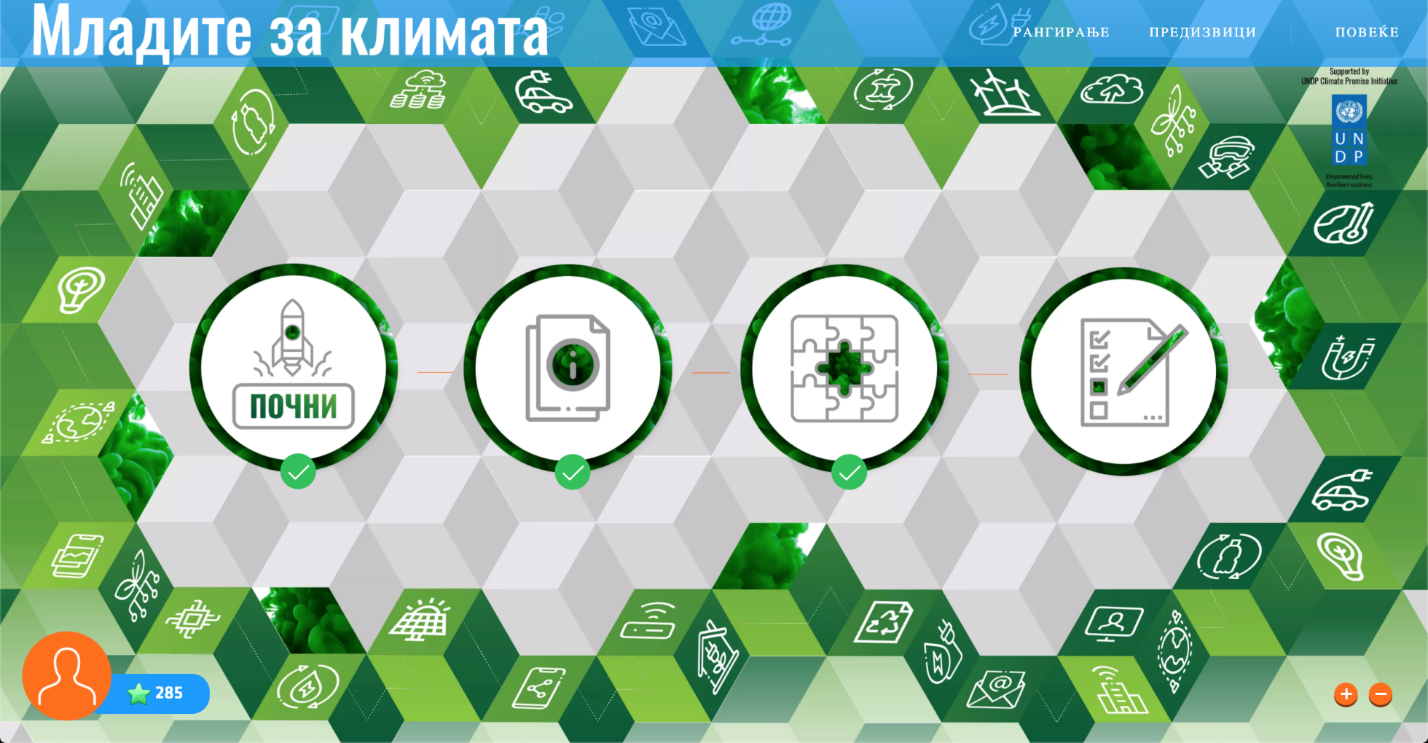Youth for climate change – first-line experience
- {{"article.by"|translate}} Marija Spasovska
- {{"article.posted"|translate}} 14-07-2021
Youth for climate change – first-line experience
In the past year, during two months (October and November), the Youth for Climate platform was launched, in which I participated, along with other 300 participants.
In the past year, during two months (October and November), the Youth for Climate platform was launched, in which I participated, along with other 300 participants. This platform was an innovative response to the efforts of UNDP and the Ministry of Environment and Physical Planning in order to involve all parties in the preparation of the document, especially those who will live the future that is planned today. The platform had a consultative role and consisted of four sections shown in four rounds on the map.

The first part consisted of a presentation, where young people should tell us something about themselves and how they heard about the platform. The second part consisted of educational materials, true / false questions and a quiz where participants had the opportunity to test their knowledge in the field of climate change. In the third part, the young people should share something about their activism, as well as suggestions for the Minister of Environment and Physical Planning, i.e. what they would do if they were in his place and their attitude towards the future of the country. The fourth part consisted of two challenges. A challenge for youth-government collaboration and a challenge that involves sharing information about the platform or climate change on social media.
The biggest impression I had from this platform and also the most interesting part was the part where young people had to propose three decisions that they would make if they were Minister of Environment and Physical Planning because this was a really interesting way to see the thinking of young people regarding climate change issues and the environment. Since they had a limited number of decisions to suggest their priorities in tackling climate change and what they consider to be most important in tackling climate change could be best seen as an answer to this question.
What surprised me the most while the platform was open and we could only see the answers to the challenges (challenge for cooperation and challenge for social media) was the knowledge of young people about climate change as well as their dedicated interest in this problem. The most interesting part in which all participants had insight into the answers of others was the part with the challenges for cooperation between the youth and the Government. Here you could see that the youth have a firm position and excellent creative solutions on how the youth can be involved together with the representatives of the public administration in tackling climate change. I could see that there was a great interest from young people for this type of cooperation. Many of them suggested that there should be an external group led by young people, which will have regular monthly / weekly meetings that will cooperate with the Government as a representative of all young people in our country and will make proposals for better management of climate change.
When the report came out, after the closing of the platform, the most interesting thing to see for me were the proposals of the young people regarding what they would do if they were Minister of Environment and Physical Planning. At the top of the list were proposals related to trees and greenery (24%). In this category, respondents cited mainly afforestation and changes in forest management (especially in the context of periods of fires). This was to be expected given the importance of trees in our ecosystem. Afforestation was also one of my suggestions since the trees and the oxygen they produce is a widely known factor that affects the quality of life of every human being. The second was the category Energy and heating (22%), especially the need for green energy sources. Given the enormous pollution we have had in the recent years, as well as the impact it has on the environment and human health, this was one of my suggestions and in my opinion it was expected to be in the top priorities of young people. The third most frequently mentioned areas of intervention were (with 16%): Education and Social Services and Waste Management - mainly discussed in the context of recycling and landfills. However, of all these categories, young people were the loudest and most of them emphasized education as a long-term way to deal with climate change on this question and also on other questions most of the participants highlighted the need for green education. They labeled this as a need for systemic change, not climate change. Many of them thought that a compulsory subject should be introduced in primary education dedicated entirely to climate change, and there were other proposals that recommended informing citizens in an informal way about how they could personally contribute to reducing the effects of climate change (advertisements, posters, local eco-centers). My suggestion was to introduce a compulsory subject in primary education - climate change and we in order students from an early age to get acquainted with climate change and its significance, as well as to further engage in innovative solutions to deal with climate change, because young people are the drivers of a society. The emphasis on climate change education as a way to a greener and healthier environment by young people really impressed me. Only with well-informed and environmentally conscious youth can we have a positive impact on reducing CO2 emissions and the harmful effects of climate change.
Klimatskipromeni.mk continues with the activities for educating the youth on issues related to climate change, what climate actions they can take and how to use the time wisely to get acquainted with all the experiences they might need in order to make the right decisions.
At the following links you can watch short inspirational videos of young activists working in the field of climate change:
Video message from Marija Manevska, youth activist - The climate is changing, why not you?
Jarchevska with a powerful message: We should constantly influence the people around us
Sara Cvetkovska: Let us not be selfish, let us help the Earth to heal
Interview with Jovanka Atanasovska - One of the winners of the competition Design and inspire!
Conversation with Andrea Koleva - Winner of the design and inspire competition
-
Корисни линкови
26-01-2021 -
Справување со климатските промени и загадувањето на воздухот во градот Скопје
29-04-2018 -
Финансирање во климата
28-01-2022 -
Микронаративи
08-06-2022
{{"article.lastestPosts"|translate}}
-
Нови финансирања за унапредување на природата и биолошката разновидност на Зелената агенда за Западен Балкан
11-03-2025 -
Започна проектот за развој на 1-от и 2-от двогодишен извештај за транспарентност и 5-от национален извештај за климатски промени на С.Македонија
04-03-2025 -
Земјоделски форум за климатски промени: Се изнаоѓаат решенија за поголема климатска отпроност на заемјоделието
02-12-2024 -
Заврши COP29, центарален фокус на финасирањето за климата
02-12-2024




 Мод за знаковен јазик
Мод за знаковен јазик Говорен асистент
Говорен асистент Означи линкови
Означи линкови

 Зголеми маус
Зголеми маус